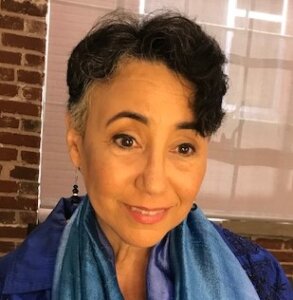‘Delightfully uncomfortable’: Commemorating Juneteenth at 3 Shabbat events
Jews of color lead gatherings in Atlanta, New York and Washington, D.C.

Graphic by Angelie Zaslavsky
While most of the nation may still be learning about Juneteenth, prominent Jews of color in Atlanta, Washington, D.C. and New York City melded the year-old federal holiday with Friday night Shabbat traditions to highlight freedom struggles and the value of working towards inclusion.
In Atlanta, a Juneteenth Kabbalat Shabbat commemorated the day Union soldiers enforced the emancipation of enslaved people in Texas with a musical celebration of joy, freedom, and liberation led by Jewish spiritual leaders of color, and refreshments that included specially made challah prepared by a local family.
At the Juneteenth Shabbat Celebration in Washington, D.C., Jews of color blended a traditional Reform ceremony with poignant reflections from diverse members of the community, and a Shabbat dinner. A film screening and discussion about racism was held on Sunday.
In New York City, community members gathered on a rooftop complete with a modern-day fiddler, to enjoy a moving service and a potluck dinner seasoned with a “delightfully uncomfortable” dialogue about the realities of making Jewish spaces truly welcoming.
“This is not a performance. This is a celebration and a service,” said Koach Baruch Frazier, a student of the Reconstructionist Rabbinical College in Wyncote, Pennsylvania, who delivered a brief sermon at the Atlanta event. He also shared the weekly Torah portion from the Book of Numbers to illustrate the shared African American and Jewish theme of having to delay the feast of freedom.
That event drew around 70 people to a live musical service at the new Distillery of Modern Art located in a Jewish community, while another 400 participants joined from all over the U.S. along with Canada and Australia via livestream.
Rabbi Sandra Lawson, founder of the nonprofit Kol HaPanim (All Faces), who has taken part in Juneteenth Shabbat events in other cities, wanted one that was planned and organized by Jews of color. She reached out to Victoria Fulcher-Raggs, co-founder and executive director of the Atlanta Jews of Color Council, and Rabbi Joshua Lesser, rabbi emeritus of Congregation Bet Haverim. While Lesser is not a Jew of color, he and Lawson have a longtime friendship and shared history of activism that makes him an accomplice rather than simply an ally, she said.
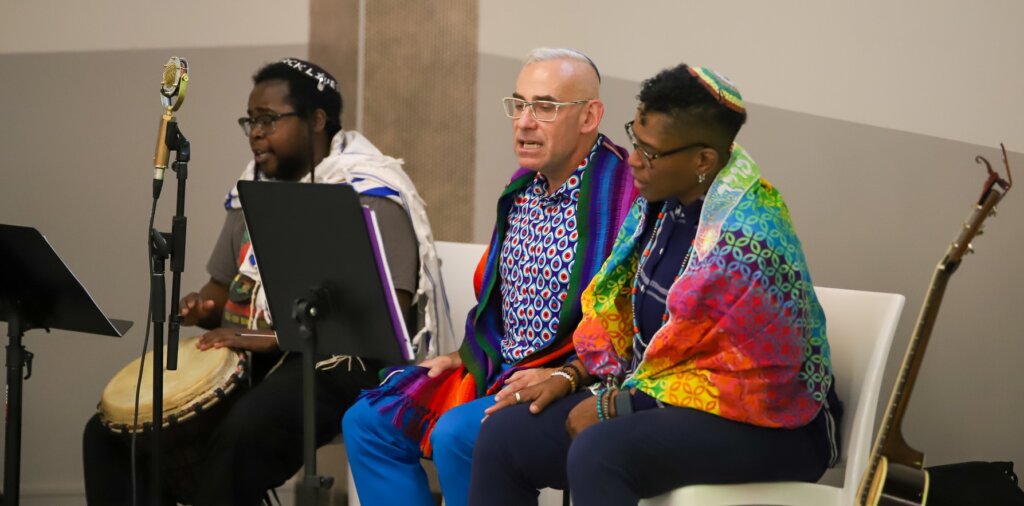
Lawson, the first director of diversity, equity, and inclusion at Reconstructing Judaism, said she wanted to uplift the voices of rabbis and spiritual leaders of color to raise awareness about the growing diversity of America’s Jewish community. The event featured her playing guitar and singing, along with Frazier, who accompanied her on an African djembe drum. While encouraging the audience to join in, they wove an inspiring tapestry that included traditional Negro spirituals like “Wade in the Water,” “Ain’t Gonna Let Nobody Turn Me Around” and “I Woke Up This Morning with My Mind Stayed on Freedom” (instead of “Jesus”), “Lecha Dodi,” and the Hebrew prayer Shehecheyanu.
In a nod to Pride Month, Lawson and Lesser – both out queer rabbis, each wearing a brightly striped tallit – offered a powerful visual of the multifaceted diversity of Jewish identity.
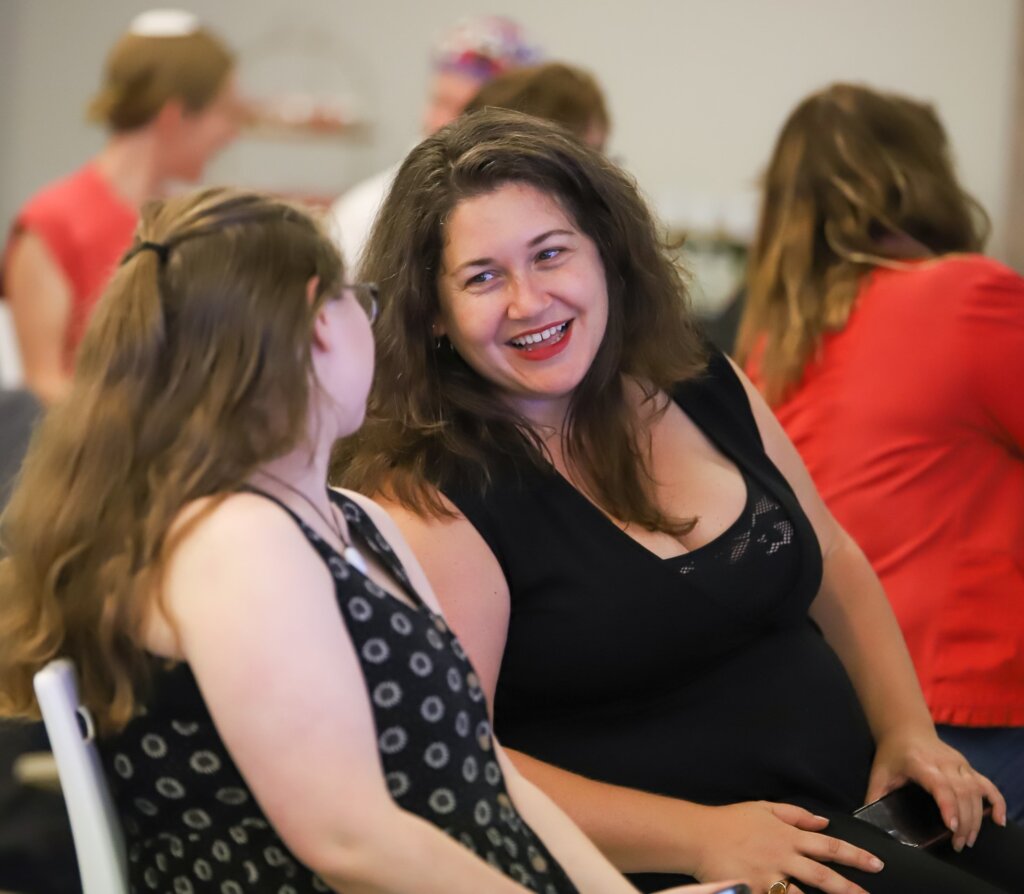
Even the refreshments had special meaning. Heidi Senior, who normally makes challah for her family’s Shabbat, wanted to contribute something special to the Juneteenth event. Senior, who was raised in a Black home that wasn’t Jewish, taught herself to make challah as an adult.
“Typically, when I make challah, it’s my time to be quiet, to pray blessings over my family,” Senior said. She taught her five children how to braid the challah, but never involved them in the full preparation. When she agreed to produce 40 small loaves for guests of the Juneteenth Shabbat, she enlisted two of her daughters, Hailey, 16, and Serena, 14.
“I do everything by hand and small batch,” she said. “We each had our own bowl for the eggs, our own bowl for the yeast. Everybody made their batches and braided their own.” As they worked, Senior was inspired by the idea of what it might have been like on June 19, 1865, if every family had their own loaf of freedom bread – their first meal as free persons. “I thought about how many traditions will be created and passed down from this day.”
An ‘interesting weaving of cultures’
A warm spring evening in New York City provided the perfect opportunity to gather on the rooftop of the Marlene Meyerson JCC in Manhattan for a Juneteenth Shabbat. The event, presented by Be’chol Lashon and the JCC with the support of Keshet and the Jewish Community Relations Council, drew about 90 people to enjoy a mix of African American spirituals, Jewish music, storytelling, a potluck dinner, and conversations designed to spark thought and inspire change.
Rabbi Isaama Goldstein Stoll, rabbi of Be’chol Lashon, led the gathering in song and spirit. “I started by sharing my experiences and thoughts on race as a Jew of color, and what it means to be a Black rabbi,” she said. “That opened up a conversation to talk about race in a way we don’t usually do. People shared pretty openly and vulnerably.”
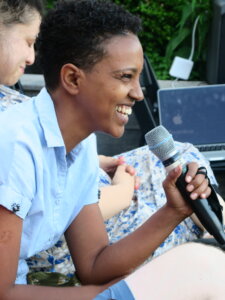
While some participants expressed discomfort at the idea that more needs to be done to make Jewish spaces inclusive, Goldstein Stoll wasn’t discouraged. “I think the conversation was delightfully uncomfortable,” she said. “I think people felt pushed, but in a safe way.”
The dinner and program had some elements of a Kabbalat Shabbat, she said, but not a traditional service. Benjamin Laufer, a native Jewish New Yorker on the Upper West Side said that while he attended preschool at the Meyerson JCC, he hasn’t consistently participated in Jewish events.
When he learned of this unique Shabbat, he decided to go because he used to work with Goldstein Stoll, and he wanted to learn more about Juneteenth. He brought his mother and a group of friends with him. “It seemed like a nice opportunity, especially given the Juneteenth holiday, which is new to me.”
Goldstein Stoll’s discussion was followed by music, including an electric violin, and poetry in what Laufer described as “a really interesting weaving of cultures.”
The potluck brought everyone together to celebrate Shabbat while mingling and continuing the conversation. “Blessings were done over challah and wine – that was the most familiar to me,” Laufer said. He said he left feeling “more informed as a result of thinking about the intersection of being an African American who has to deal with the realities of their history while also being a Jewish American and having to deal with those experiences.”
Starting conversations was one of Goldstein Stoll’s priorities for the event. “I think Juneteenth provides a unique opportunity for us to double down on talk about race as a Jewish community,” Goldstein Stoll said. “It’s not always apparent to me where that conversation should start, or what the right answers are. But starting that conversation was absolutely one of the goals that I had for this event.”
‘Keep speaking out against injustices’
Washington Hebrew Congregation in the nation’s capital combined a Friday night Juneteenth Kabbalat Shabbat with a screening and discussion of the film “Who We Are: A Chronicle of Racism in America” on Sunday, June 19.
“This is the first time that Washington Hebrew is honoring Juneteenth with a Shabbat celebration, and the first time that the entire Jewish community in D.C. is coming together to celebrate this,” said Joshua Maxey, executive director of Bet Mishpachah, and the leader of Washington Hebrew’s Jews of Color Affinity Group. “To bring more light to the fact that we have Jews of color in our community, we put this service together to recognize the importance of Juneteenth – especially to Black Americans – and have an opportunity for Jews of color to come together and to have their voices heard throughout the community,” he said.
Maxey was inspired to create this event for the community to celebrate Juneteenth in 2021 when the Jews of Color Initiative released its study, “Beyond the Count,” revealing that some 80 percent of Jews of color experienced some form of discrimination in Jewish institutions based on their race.
The Friday event started with the Kabbalat Shabbat, a traditional reform ceremony with added reflections from community members Dee Sanae, founder of Mosaic Visions; Sabrina Sojourner, community chaplain and spiritual leader for Revitz House; Toreno Herbert, head of Jews of Color Affinty Group at Adas Israel Congregation; and Joseph Levin-Manning, founder and leader of Capital Qvellers, a grassroots community group for queer Jewish young professionals.
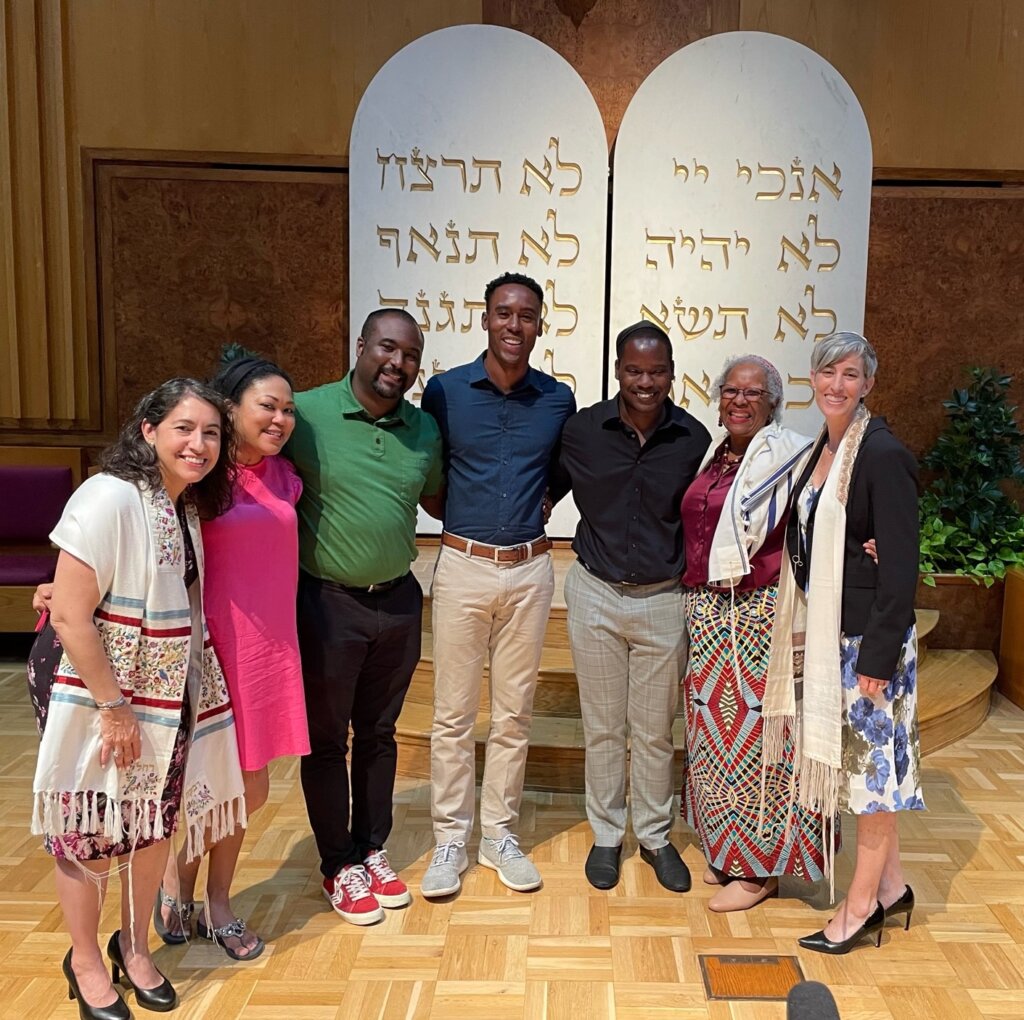
Reflections on peace, and on moving from bondage to freedom were interwoven with the liturgy, the Mi Chamocha, and the singing of Oseh Shalom. Levin-Manning spoke about the importance of language and being thoughtful and intentional about what is said, especially in the diversity, equity, inclusion, and justice space. “We might talk about progress being made but we shouldn’t discount or erase or not remember that there is still much to be done,” he said.
Herbert spoke about light in times of darkness. “We are constantly living with examples of these hard times through the continued loss of life from COVID-19, rising white nationalism and overt racism, gun violence, and an unstable political system where truth is looked at as weakness,” he said. “Still, there is hope and joy in this world. The light we bring might not be the brightest each day, but it is noticeable. Keep protesting, keep speaking out against injustices, keep fighting for change, and keep being kind.”
Levin-Manning said he sees the potential for progress. “This was a great first event and it laid a good foundation for this conversation, but we can always do more,” he said. “It’s not just about integrating something into Jewish ritual, which is great and can have a real impact. But what else are you doing to follow up on it beyond a check-the-mark box so that people are able to engage beyond a particular event?”
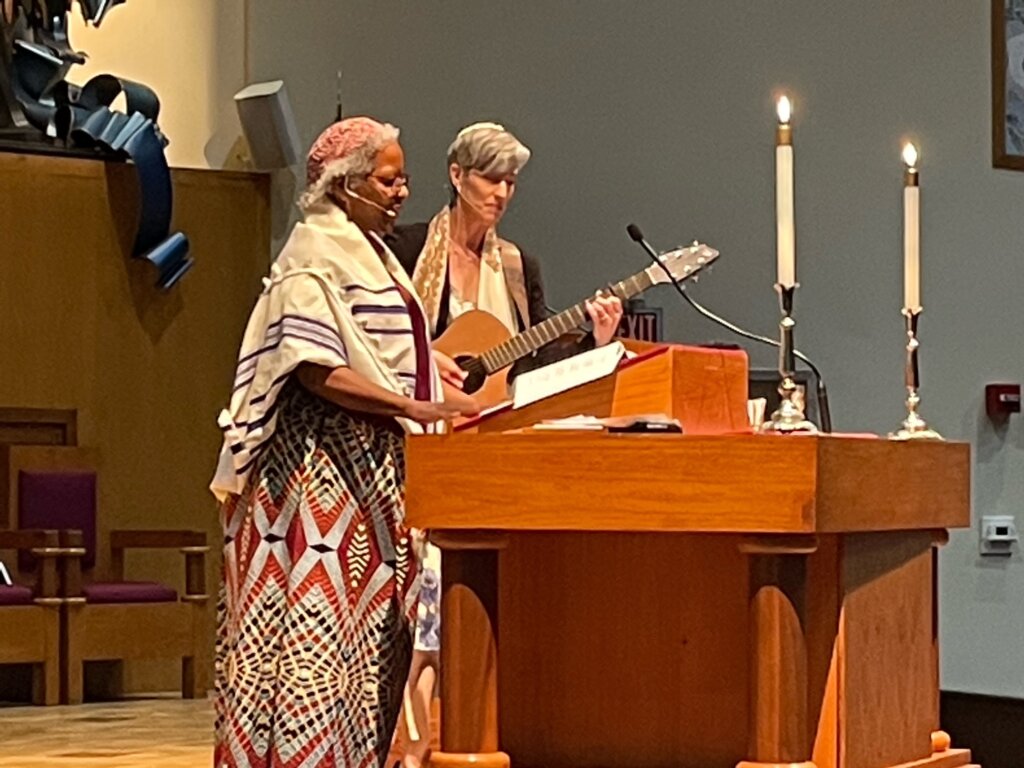
Rabbi Ruth Abusch-Madger, rabbi-in-residence and director of education at Be’Chol Lashon, who has worked with the organizers of the Atlanta, New York City, and Washington, D.C. events, said she is “seeing a new kind of leadership developing, which is really important. It’s very exciting to me that we now have a plurality of Black rabbis and that Juneteenth is being celebrated and led by these amazing people who have so much to give to our community,” she said.
Micah Dicker, a Jewish resident of the Upper West Side whose mother is a Jew of color, accompanied Laufer to the New York event. “One thing I sort of knew but that the event drove home was that no two Jews of color have the same experiences,” he said. “It got a lot of people to think about their own and other people’s identities.”
